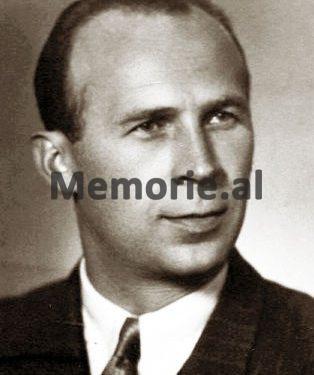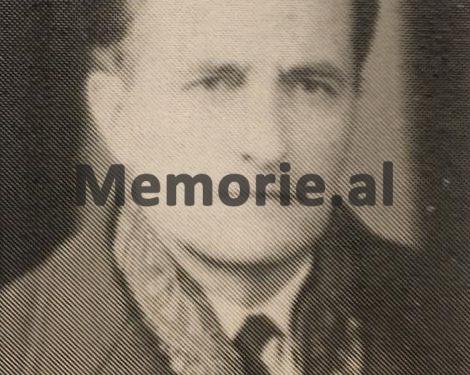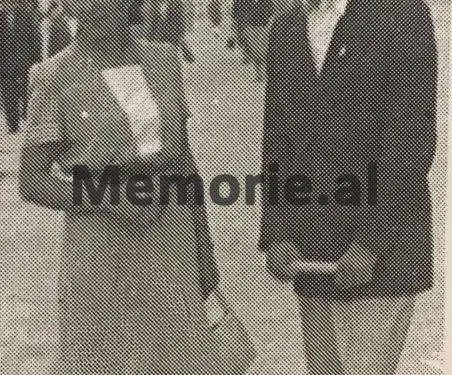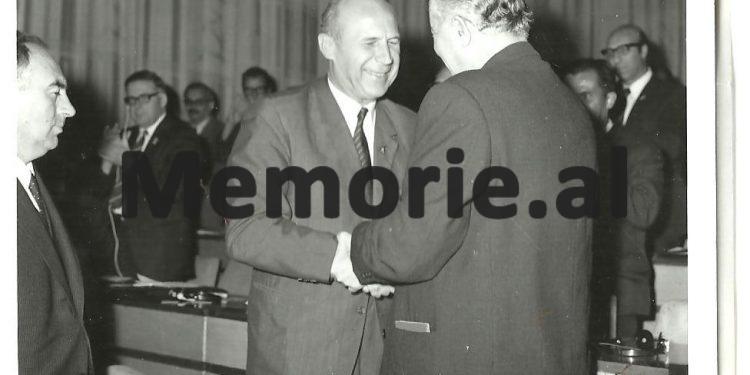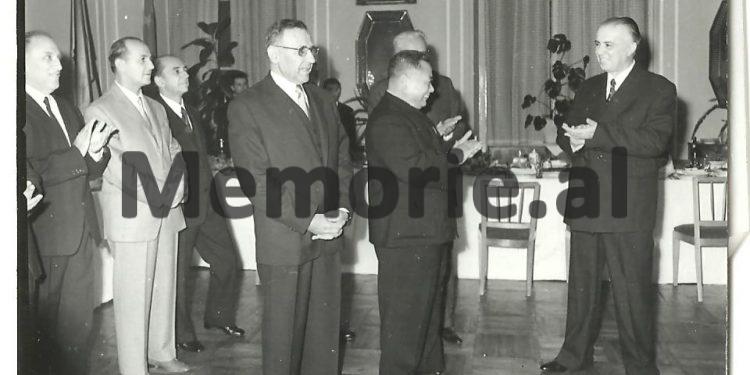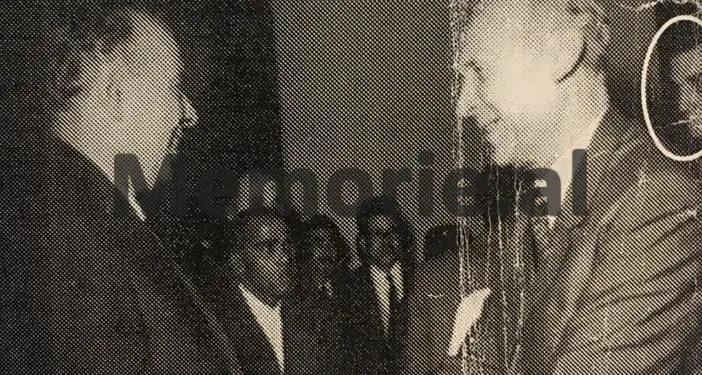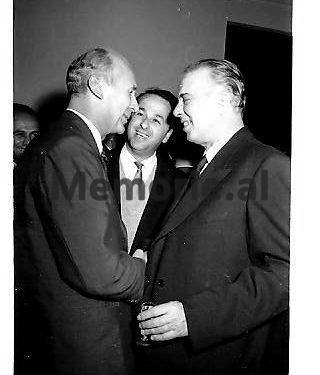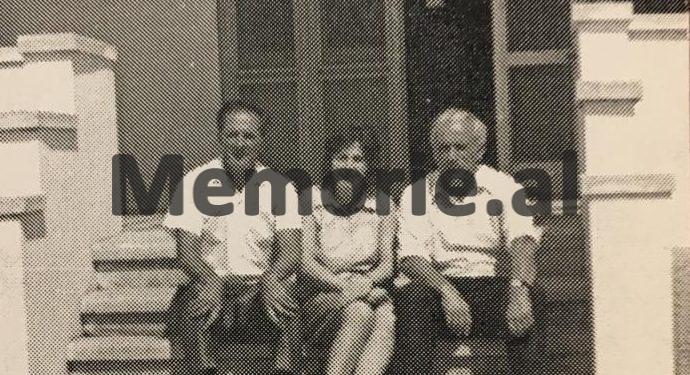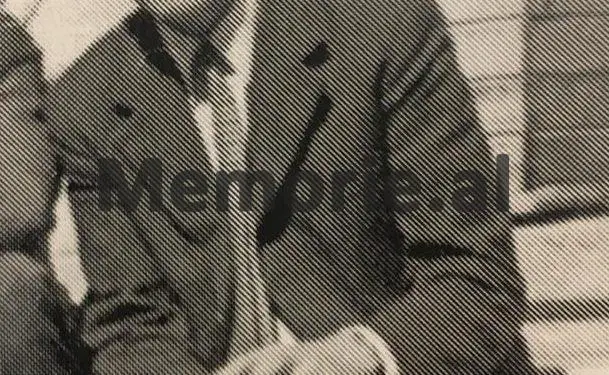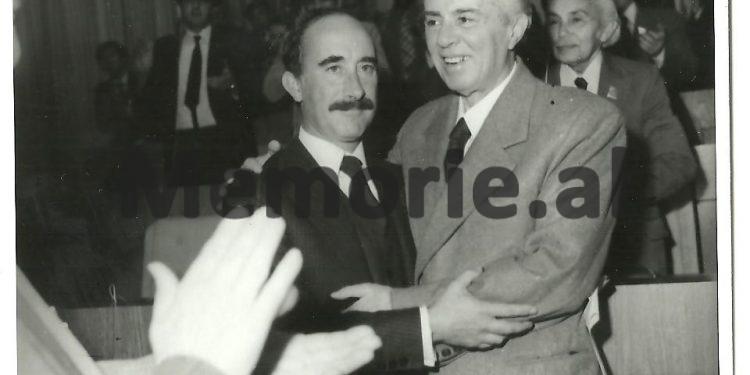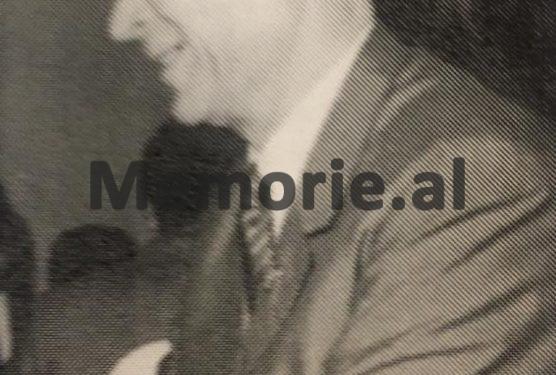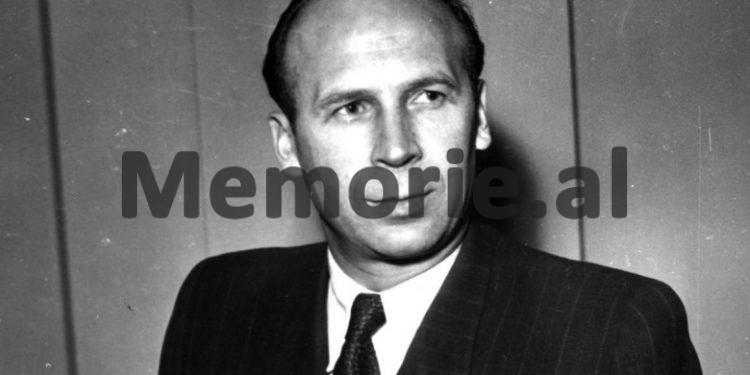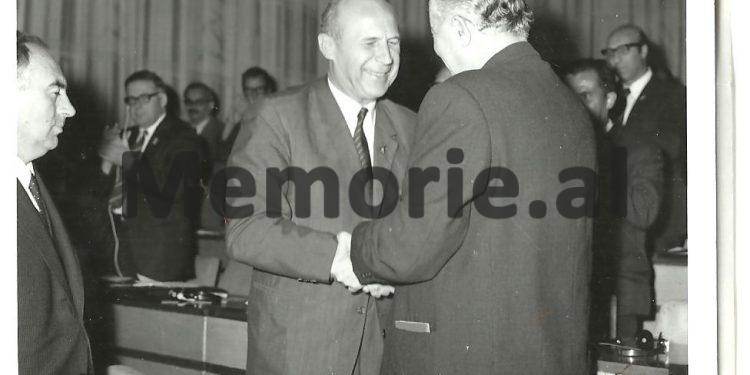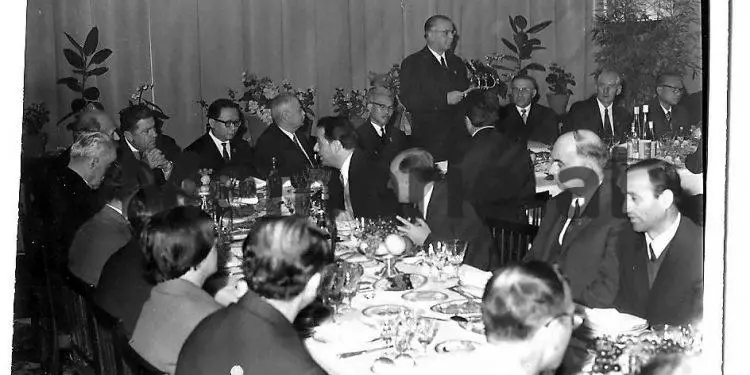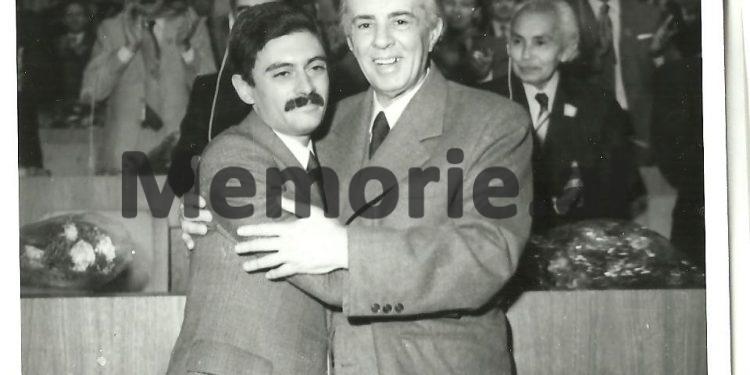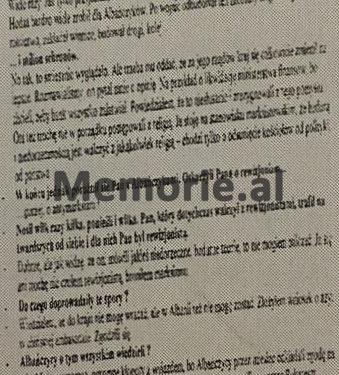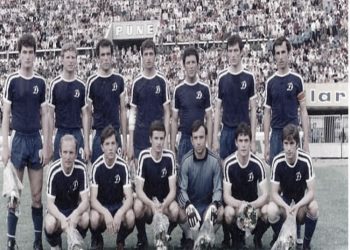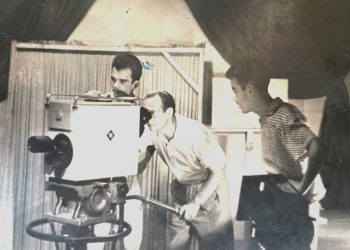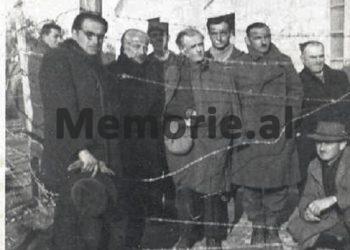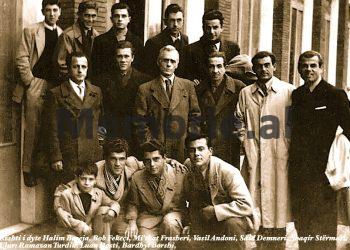Dashnor Kaloçi
Memorie.al publishes an interview with Kazhimierzh Mijal, who is 1966, while working for the National Bank of Warsaw, illegally founded the Communist Party of Poland and, after risking arrest, sought the help of the Albanian embassy in Warsaw, which provided with a diplomatic passport and escorted him to several countries, until he came to Italy, where he arrived in Albania by ferry from the city of Bari, where he was immediately visited by Enver Hoxha with Ramiz Alia. The rare testimony of the former chairman of the Communist Party of Poland, Kazhimierzh Mijal, in his interview given to the Polish magazine “New State”, in 2001, when he was 91 years old, about the vicissitudes of his arrival in Albania as illegal, the conditions of accommodation and treatment offered by the senior leadership of the ALP, with available villas, security guards and a large staff that served them, meetings and conversations with Enver Hoxha, as well as the contradictions that arose in 1978, when they expelled him by labeling him an “anti-Marxist” and he was able to leave after some vicissitudes, with the help of the Chinese embassy in Tirana, arriving in Beijing on July 1 of that year.
“When I arrived in Tirana, Enver Hoxha visited me with the second Secretary, Ramiz Alia, with whom I met and talked often, and they asked me about many things to give my opinion. Enver once asked me about the liquidation of the Ministry of Finance, because he wanted all the actions to be done by the Bank, but I told him that it was not fair and he gave up that opinion.
Albanians did not do well with religion. In Tirana, I was accommodated in a special villa where I lived alone and was served by a whole staff, up to the Security people guarding the outside of the villa wall. When the divergences with the Albanian leadership arose and I submitted the request to the Chinese embassy for political asylum in China, the guards on the street and in the yard were strengthened, and in addition, my phone was cut off. This is how Kazhimierzh Mijal, former chairman of the Communist Party of Poland, recalled his arrival in Albania in a lengthy interview given to the Polish magazine, The New State, recounting his entire 12-year adventure. his stay in Albania and his relations with Enver Hoxha, who in 1978 declared him “anti-Marxist” and expelled him from Albania. In the interview, we are publishing on Memorie. al, Mijal recounts his entire odyssey, since his arrival in Albania, his treatment for 12 years and his break-up with Enver Hoxha, and his expulsion from Albania in 1978…
Sir, Mijal, during the time you were the Director of the Investment Bank of Poland, you did not stop your political activity, but this time outside the Polish Labor Party?
In 1963 I wrote the pamphlet “In the War for Victory, Passivity and Silence Are Loss,” which came out as anonymous without my name. At the time, the publication of this book caused a great deal of controversy, and I was summoned to the Central Control Commission of the Party. There I was asked about the brochure, but I objected, denying that I was its author.
How can you publish that brochure?
At first, 10,000 copies were published in Albania, and from there they came to Poland through the Albanian embassy in Warsaw. At first, the employee of the Investment Bank, who was called Shnjeçinjski, had contacts with Albanians, and then the Albanian embassy established contacts with me.
As far as I know, at that time Albanians were very interested in Poland and for that, they formed the Polish section on Radio Tirana?
From time to time my materials were used there. Then, when I was living in Albania, I once gave an interview, but I had nothing to do with those of the Radio section in Polish.
How did you hand over the text of the brochure to the Albanians in the typewriter?
It was handed over to him by Shnjecinjski.
Does he even say that he wrote that booklet himself?
This is not true. He fantasizes and is a careerist.
After the publication of the brochure, were you forced to leave the Bank?
The Minister of Finance informed me of the decision of Prime Minister Çirankijeviç që, that within two hours, I had to leave the Bank. I did so and could only greet some of the directors.
After your vacation, what did you do?
After I was fired from my job at the Bank, I was unemployed for six months. At that time, my pension was brought to the house where I lived, which was located in Warsaw on “Bota e Re” Street, no. 25. The entrance to that house passed through the courtyard, while in the courtyard for half a year there was a car and some people who were always there. If anyone came to meet me, then these people would stop him and register him, while they were constantly following me. Six months later, I was called by the Ministry of Industry and informed that I had been appointed Economic Director of the Heavy Machine-Building Industry Community. This was my last job before leaving Poland.
Sir, you were persecuted because of your political activity, because several different sources say that you founded the Communist Party of Poland in Albania?
This is not true, the Communist Party of Poland was founded on December 4, 1965, in Warsaw, coinciding with the feast day of St. Barbara. This is what those people who were in my mind with my views asked me to do. At that time we were aware that the governments of Gomulka were leading us to capitalism and we came to the conclusion that we should be organized. The founders of the Communist Party of Poland were no ordinary people. The party was then formed by four former members of the Central Committee of the United Labor Party of Poland: Vladislav Dvorakovski, Hilari Hellhovski, Stanjislav Broxhinjski and myself. The first two have even been members of the Politburo.
Sir, what was the reason you fled to Albania?
At that time, the members of the Central Committee informed me that if I stayed longer in Warsaw, a secure arrest awaited me, and this was especially true if the leaflets for the establishment of the Communist Party of Poland, which in fact came out, were circulated. circulated after my departure. At the time, I asked friends why I had to leave alone and whether it was better for me to go with Dvorakovsky. But my friends replied that: Dvorakovski had been a senior official in the Ministry of Internal Affairs of Poland and he was not allowed to leave Poland. Based on this fact, my friends suggested that it would be better for me to leave. alone.
You are said to have escaped from Poland dressed as a woman?
This is not true at all. At that time, the Albanian embassy in Warsaw provided me with a diplomatic passport, and on February 13, 1966, I left for Berlin from Warsaw Central Railway Station, where I was escorted to Cesllav Bliharski, where I was housed. meeting of the Central Committee of our Party. The day I left, it was snowing heavily and it was very cold, so I had to put on a big leather coat and lingerie with only a small handbag. I had not taken any other luggage or luggage with me, so as not to arouse suspicion. At the Polish-German border, I was stopped because my passport turned out to be a mistake made by those of the Albanian embassy in Warsaw, who did not give me the form that was needed to cross the border. At the border, I explained in Russian that I had no form and they then allowed me to cross. From East Berlin, the Albanian ambassador accompanied me to West Berlin, and from there I flew to Paris. When I arrived in the French capital, it was very warm and with the clothes I had I looked like I was coming from the North Pole, so the Albanians bought me an overcoat, which I still have today. After a two-day stay in Paris, I flew to Rome and from there from Brindisi to Durres by ferry. This is all about how I left Poland for Albania.
During your 12-year stay in Albania, did you miss your family, relatives, and friends in Poland?
Of course, I missed it, but I had nothing to do.
When did you first meet your family after your departure from Poland?
I met the family only when I returned to Poland in 1983, after eighteen years. But throughout that time, we have kept in constant contact by writing letters, which I never sent to the home address. Likewise, throughout my emigration, I kept in touch and met with key comrades of the Polish Communist Party. I was also the editor of the magazine “Red Flag”, which penetrated Poland where it multiplied. At the time, the Polish secret services constantly monitored Albanians and Chinese, so my friends sent my materials through Austria, Germany, France, and the Scandinavian countries.
What did you do at that time in Albania and how did you spend your time?
During my long stay in Albania, I was mainly engaged in reading, but I was reading a lot. There I had the opportunity to meet with all the representatives of the communist parties visiting Albania. I also met with Mao Zedong’s successor, Kan Shen, who at the end of 1966 invited me to visit China for a month.
Where did you live in Albania?
Albanian friends had accommodated me in a villa in Tirana, where I lived alone. In the morning the cook would come, and in the garden, there was a small house for the Security staff, while outside the wall of the villa, a soldier was moving. I stayed there quite quietly, but when the divergences started and I decided to leave for China, then the guards on the street and in the yard were strengthened, and in addition, my phone was cut off. Before divergences were created, everything was fine. I went for walks and traveled almost all over Albania. It was warm and very nice.
How did you live in Albania?
I did not receive money in cash, but a party employee paid for everything. I never went out without the officer guarding me.
Have you had the opportunity to meet with Enver Hoxha?
Many times. As soon as I went to Albania, Enver Hoxha visited me together with Ramiz Alia. Enver Hoxha did too much for the Albanians. After the war he rebuilt this backward country, developed agriculture, built vineyards, built roads, railways, and so on.
… And millions of bunkers?
Yes, that’s right, it seemed ridiculous. But you have to know that under the leadership of his governments, the country changed completely for the better. I talked to Enver Hoxha often and he asked me to give him an opinion. For example, for the liquidation of the Ministry of Finance, because they wanted the Bank to do everything for them. I told him this was not fair and they gave up on this opinion. The Albanian leadership did not do well with religion. I stand by the Marxist position that it is foolish and inappropriate to fight against any religion because the issue is the departure of the Church from politics and the state.
In the end, however, did you have divergences with the Albanians who accused you of being a revisionist?
Yes it is true they accused me and worse, they told me anti-Marxist.
The pitcher goes several times for water to the spring, but will sometimes break. Mr. Mijal, you fought against revisionism until then, did you encounter stronger people than you, and for them, you were a revisionist?
That’s right, but when I saw that they were talking nonsense and inappropriate theories, I couldn’t keep quiet. I did not feel at all like a revisionist, on the contrary, I defended Marxism.
What was the end of these divergences you had with the Albanians?
I knew that I could not return to my homeland, but I could not stay in Albania either. Based on this, I submitted the request for political asylum at the Chinese embassy in Tirana and they accepted it.
Did Albanians know everything about this?
No. But then I had a lot of trouble leaving Albania because the Albanians postponed for a month the approval for my departure. I even had trouble flying, but finally, fortunately, on July 1, 1978, I arrived in Beijing via Bucharest./Memorie.al




